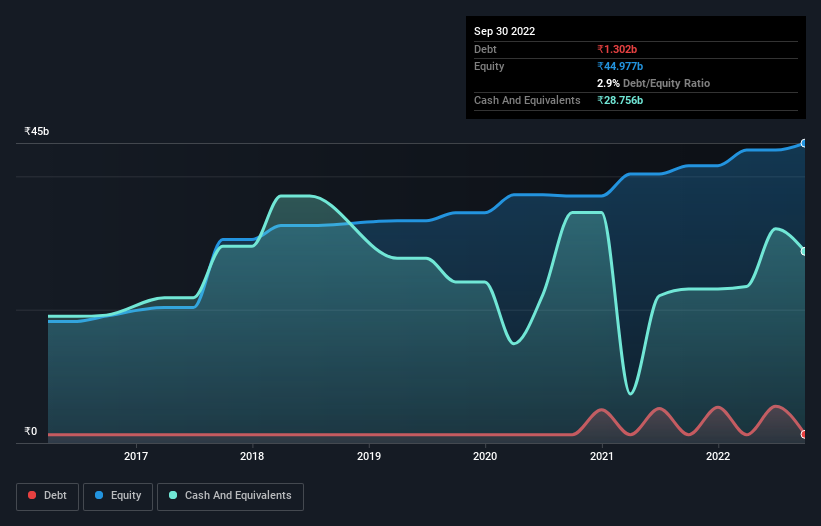Cochin Shipyard (NSE:COCHINSHIP) Seems To Use Debt Quite Sensibly

The external fund manager backed by Berkshire Hathaway's Charlie Munger, Li Lu, makes no bones about it when he says 'The biggest investment risk is not the volatility of prices, but whether you will suffer a permanent loss of capital.' So it seems the smart money knows that debt - which is usually involved in bankruptcies - is a very important factor, when you assess how risky a company is. We note that Cochin Shipyard Limited (NSE:COCHINSHIP) does have debt on its balance sheet. But the real question is whether this debt is making the company risky.
When Is Debt A Problem?
Generally speaking, debt only becomes a real problem when a company can't easily pay it off, either by raising capital or with its own cash flow. Ultimately, if the company can't fulfill its legal obligations to repay debt, shareholders could walk away with nothing. However, a more common (but still painful) scenario is that it has to raise new equity capital at a low price, thus permanently diluting shareholders. Of course, plenty of companies use debt to fund growth, without any negative consequences. When we examine debt levels, we first consider both cash and debt levels, together.
Check out our latest analysis for Cochin Shipyard
What Is Cochin Shipyard's Net Debt?
You can click the graphic below for the historical numbers, but it shows that as of September 2022 Cochin Shipyard had ₹1.30b of debt, an increase on ₹1.23b, over one year. However, it does have ₹28.8b in cash offsetting this, leading to net cash of ₹27.5b.

How Strong Is Cochin Shipyard's Balance Sheet?
Zooming in on the latest balance sheet data, we can see that Cochin Shipyard had liabilities of ₹31.1b due within 12 months and liabilities of ₹5.58b due beyond that. On the other hand, it had cash of ₹28.8b and ₹6.83b worth of receivables due within a year. So its liabilities outweigh the sum of its cash and (near-term) receivables by ₹1.13b.
Having regard to Cochin Shipyard's size, it seems that its liquid assets are well balanced with its total liabilities. So it's very unlikely that the ₹64.0b company is short on cash, but still worth keeping an eye on the balance sheet. Despite its noteworthy liabilities, Cochin Shipyard boasts net cash, so it's fair to say it does not have a heavy debt load!
But the other side of the story is that Cochin Shipyard saw its EBIT decline by 7.2% over the last year. If earnings continue to decline at that rate the company may have increasing difficulty managing its debt load. When analysing debt levels, the balance sheet is the obvious place to start. But it is Cochin Shipyard's earnings that will influence how the balance sheet holds up in the future. So when considering debt, it's definitely worth looking at the earnings trend. Click here for an interactive snapshot.
But our final consideration is also important, because a company cannot pay debt with paper profits; it needs cold hard cash. Cochin Shipyard may have net cash on the balance sheet, but it is still interesting to look at how well the business converts its earnings before interest and tax (EBIT) to free cash flow, because that will influence both its need for, and its capacity to manage debt. During the last three years, Cochin Shipyard produced sturdy free cash flow equating to 58% of its EBIT, about what we'd expect. This cold hard cash means it can reduce its debt when it wants to.
Summing Up
While it is always sensible to look at a company's total liabilities, it is very reassuring that Cochin Shipyard has ₹27.5b in net cash. So we are not troubled with Cochin Shipyard's debt use. There's no doubt that we learn most about debt from the balance sheet. However, not all investment risk resides within the balance sheet - far from it. For instance, we've identified 2 warning signs for Cochin Shipyard that you should be aware of.
If, after all that, you're more interested in a fast growing company with a rock-solid balance sheet, then check out our list of net cash growth stocks without delay.
New: AI Stock Screener & Alerts
Our new AI Stock Screener scans the market every day to uncover opportunities.
• Dividend Powerhouses (3%+ Yield)
• Undervalued Small Caps with Insider Buying
• High growth Tech and AI Companies
Or build your own from over 50 metrics.
Have feedback on this article? Concerned about the content? Get in touch with us directly. Alternatively, email editorial-team (at) simplywallst.com.
This article by Simply Wall St is general in nature. We provide commentary based on historical data and analyst forecasts only using an unbiased methodology and our articles are not intended to be financial advice. It does not constitute a recommendation to buy or sell any stock, and does not take account of your objectives, or your financial situation. We aim to bring you long-term focused analysis driven by fundamental data. Note that our analysis may not factor in the latest price-sensitive company announcements or qualitative material. Simply Wall St has no position in any stocks mentioned.
About NSEI:COCHINSHIP
Cochin Shipyard
Engages in the shipbuilding and repair of ships/offshore structures in India.
Solid track record with adequate balance sheet.
Similar Companies
Market Insights
Community Narratives



